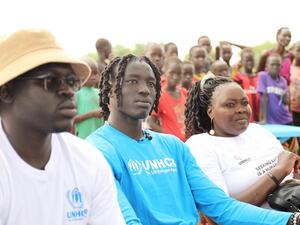More than 4,500 Sri Lankan IDPs return home in Trincomalee district
More than 4,500 Sri Lankan IDPs return home in Trincomalee district

An IDP camp in Batticaloa earlier this year, housing SriLankans displaced by the continuing conflict.
TRINCOMALEE, Sri Lanka, 6 August (UNHCR) - Welcoming visitors into her home made from UNHCR plastic sheeting, Singaranvel, a 47-year-old mother of three, wears a broad smile.
Today she has a good reason to smile: after 16 months on the run from Sri Lanka's civil war, she and her family are about to go home from the Kilivetti IDP transit centre in the Trincomalee District of eastern Sri Lanka. IDP is the abbreviation for what she and her family are - internally displaced people, like refugees, but within their own country.
Her family's saga began in April, 2006, when she and her three sons left their home village of Vinayagapuram in the Echchilampattu division of Trincomalee, fleeing clashes between the Sri Lankan Army and the rebel Liberation Tigers of Tamil Eelam. Their trek covered not only Echchilampattu division, but also temporary stays in other places in Trincomalee district and neighbouring Batticaloa district.
"We are tired of moving from one place to another," Singaranvel says. "I need to go back home. I cannot live like this anymore."
Families like hers in eastern and northern Sri Lanka have had their lives disrupted repeatedly by civil war over the last 25 years. Singaranvel says her husband disappeared in 1992, taken by armed men while working on his farm.
"For more than 15 years I have been enquiring to the government and different NGOs (non-governmental organizations) about his whereabouts but nobody could give me any information," she says. Her three sons, she adds, "had to marry very young in order to avoid being recruited by armed groups."
Most of the 3,900 IDPs in Kilivetti transit centre fled their homes in April 2006 when a bomb in Trincomalee town and ensuing communal violence re-ignited the civil war that had been temporarily quieted by a 2002 ceasefire.
By March of this year, the government was claiming success in clearing eastern areas of rebels, and it opened this transit centre in Western Muttur, filling it with displaced people who had been staying in other sites in Batticaloa and Trincomalee. Many have been in the transit centre since March, waiting for their home areas to become safe to return to.
During June and July this year, some 4,500 people returned home to Echchilampattu, mainly from IDP sites in Batticaloa. The UN refugee agency supports their reintegration and regularly visits areas of return to monitor returnees' general welfare and security.
"Going home is of course what all displaced people and refugees around the world long for," says Amin Awad, UNHCR Representative in Sri Lanka. "We are very glad that the situation in the eastern part of the country allows some people to go back to their home villages and restart their lives. However, security conditions for the returnees need to be markedly improved."
Another person whose day has come is Singaranvel's neighbour in the transit centre, Kalirasa, a father of five children. He is about to go back to his home village, along with 600 other displaced people from Echchilampattu.
"We are very happy to leave for home since life as IDPs is very hard and we have no privacy living in a transit centre," said Kalirasa. His one worry, though, is how he will support his family back home.
The returnees are provided with kitchen sets, clothing, buckets and sleeping mats by the UN refugee agency, UNICEF and Save the Children. Sri Lankan authorities also distribute food.
Despite this help, Kalirasa says, "We need more long-term support from agencies, as we left our villages with nothing and we basically have to start our lives from scratch." As a farmer, he has to wait until the next rice harvest in October to find a job and earn some money.
Vanaraja, a former fisherman, returned to his village with his wife and two children in mid-June - to a new home donated by a Sri Lankan NGO - but still has a major worry: the coastline is closed for fishing.
"I am not sure what happened with my small boat and nets.... I do not know if they are still there," he frets. He's living off food rations distributed by the Sri Lankan government, but would prefer to return to fishing for a living.
"Our situation is much better now than before as IDPs," he says, "but we still have some concerns about our future, we need some help to continue with our lives."
By Beatriz Gonzalez in Trincomalee, Sri Lanka








